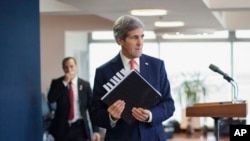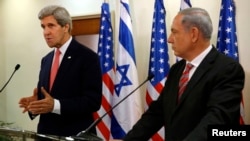JERUSALEM —
U.S. Secretary of State John Kerry says he believes Israel and the Palestinians are closer to a peace agreement than they have been in years at the end of a three-day trip to the region.
Kerry told reporters Friday before leaving Israel that despite the obstacles he was encouraged by the commitment of Israeli Prime Minister Benjamin Netanyahu and Palestinian Authority President Mahmoud Abbas to the pursuit of peace.
"Together there is no doubt in my mind we can reach an agreement that will support the peaceful and promising Palestine that the Palestinian people deserve alongside a prosperous and a more secure Israel," said Kerry.
Kerry's visit came amid reports that the talks were faltering over Israeli concerns about security in the West Bank and Palestinian anger over the continued construction of Jewish settlements in the West Bank.
The talks resumed four months ago after a three-year suspension. They are to continue for another five months.
Kerry dismissed media speculation of a breakdown in the talks saying the two sides have maintained regular discussions.
He also declined to provide details on reports that U.S. mediators have made proposals regarding security in the Palestinian territories but indicated that such an effort was underway.
"If Israel's security cannot be increased through this agreement it's very difficult to make an agreement," said Kerry. "So we are making certain that we are addressing each and every one of those questions."
Kerry also sought to ease Israeli alarm over the recently concluded interim agreement on Iran's alleged nuclear weapons program.
Under the accord, Iran agreed to freeze any work on this program in exchange for a partial lifting of international economic sanctions that have hurt its economy.
Netanyahu has repeatedly called it a bad agreement. Iran says its nuclear program is for peaceful purposes only.
Kerry said he was convinced that Israel is safer as a result of the accord.
"Israel and the United States are absolutely in synch (agreement), not an ounce of daylight between us, with respect to the need to make sure that Iran cannot achieve a nuclear weapon, will not in the future be able to achieve it and certainly cannot move towards it without the United States of America and Israel knowing that, and therefore being able to take steps to deal with that," Kerry said.
He said the accord provided the best opportunity to resolve the concerns of the international community and pledged to return to the region in a few weeks if necessary.
Kerry told reporters Friday before leaving Israel that despite the obstacles he was encouraged by the commitment of Israeli Prime Minister Benjamin Netanyahu and Palestinian Authority President Mahmoud Abbas to the pursuit of peace.
"Together there is no doubt in my mind we can reach an agreement that will support the peaceful and promising Palestine that the Palestinian people deserve alongside a prosperous and a more secure Israel," said Kerry.
Kerry's visit came amid reports that the talks were faltering over Israeli concerns about security in the West Bank and Palestinian anger over the continued construction of Jewish settlements in the West Bank.
The talks resumed four months ago after a three-year suspension. They are to continue for another five months.
Kerry dismissed media speculation of a breakdown in the talks saying the two sides have maintained regular discussions.
He also declined to provide details on reports that U.S. mediators have made proposals regarding security in the Palestinian territories but indicated that such an effort was underway.
"If Israel's security cannot be increased through this agreement it's very difficult to make an agreement," said Kerry. "So we are making certain that we are addressing each and every one of those questions."
Kerry also sought to ease Israeli alarm over the recently concluded interim agreement on Iran's alleged nuclear weapons program.
Under the accord, Iran agreed to freeze any work on this program in exchange for a partial lifting of international economic sanctions that have hurt its economy.
Netanyahu has repeatedly called it a bad agreement. Iran says its nuclear program is for peaceful purposes only.
Kerry said he was convinced that Israel is safer as a result of the accord.
"Israel and the United States are absolutely in synch (agreement), not an ounce of daylight between us, with respect to the need to make sure that Iran cannot achieve a nuclear weapon, will not in the future be able to achieve it and certainly cannot move towards it without the United States of America and Israel knowing that, and therefore being able to take steps to deal with that," Kerry said.
He said the accord provided the best opportunity to resolve the concerns of the international community and pledged to return to the region in a few weeks if necessary.





